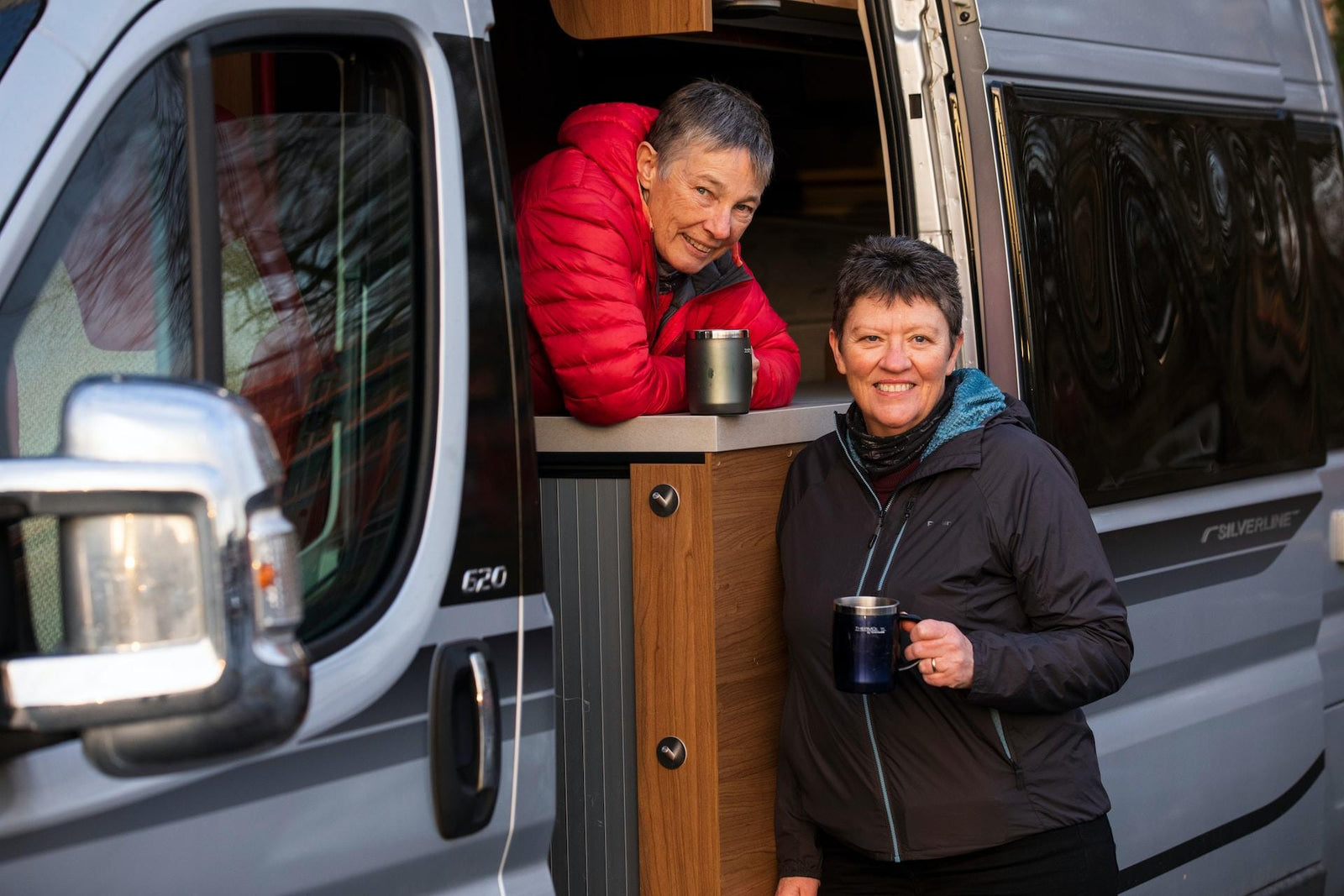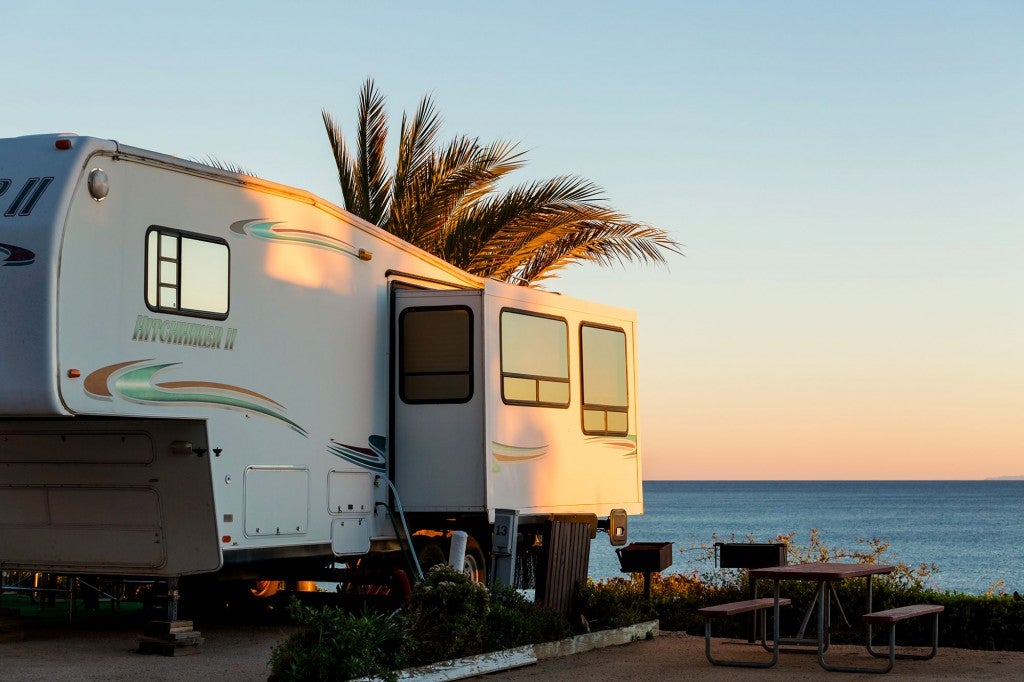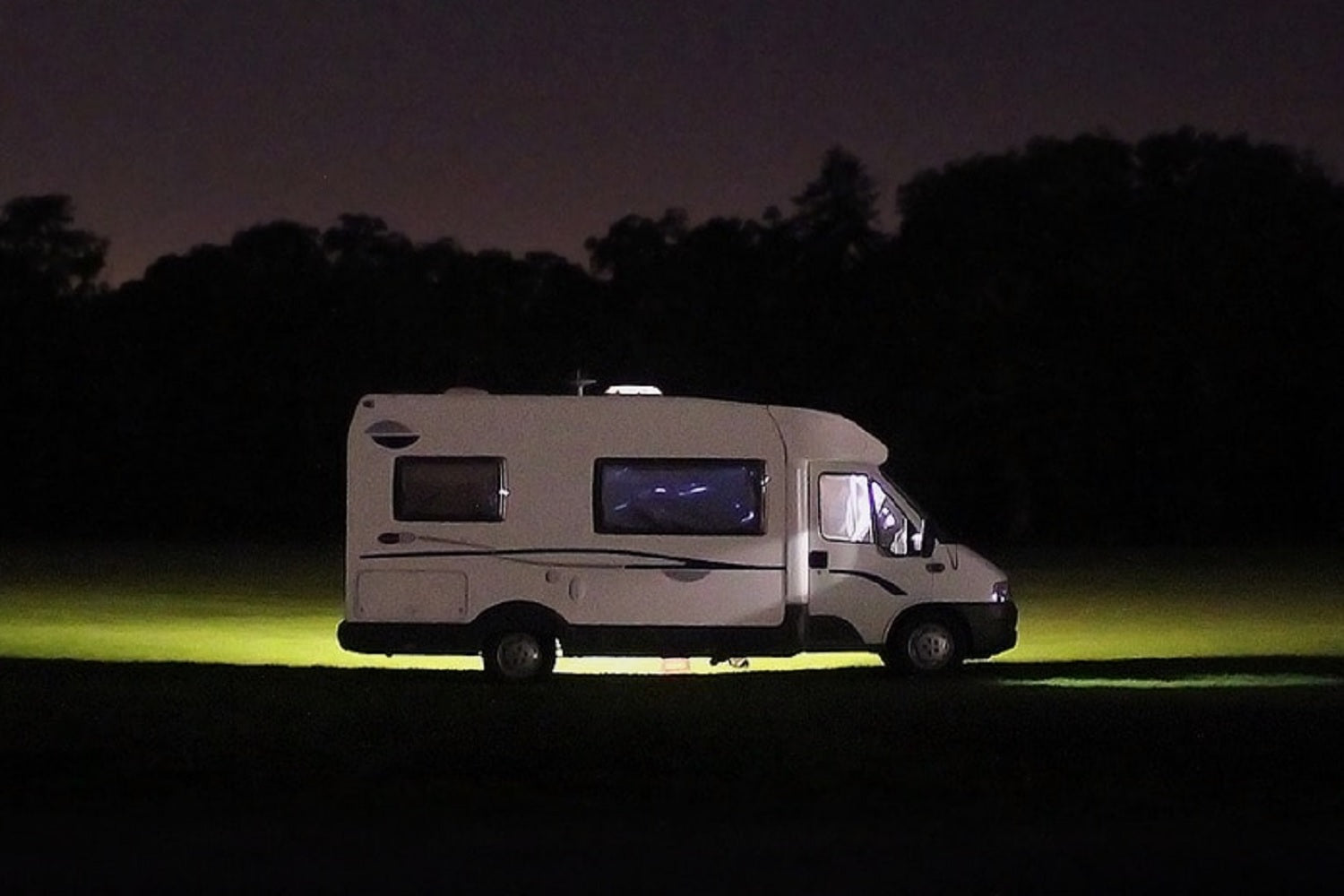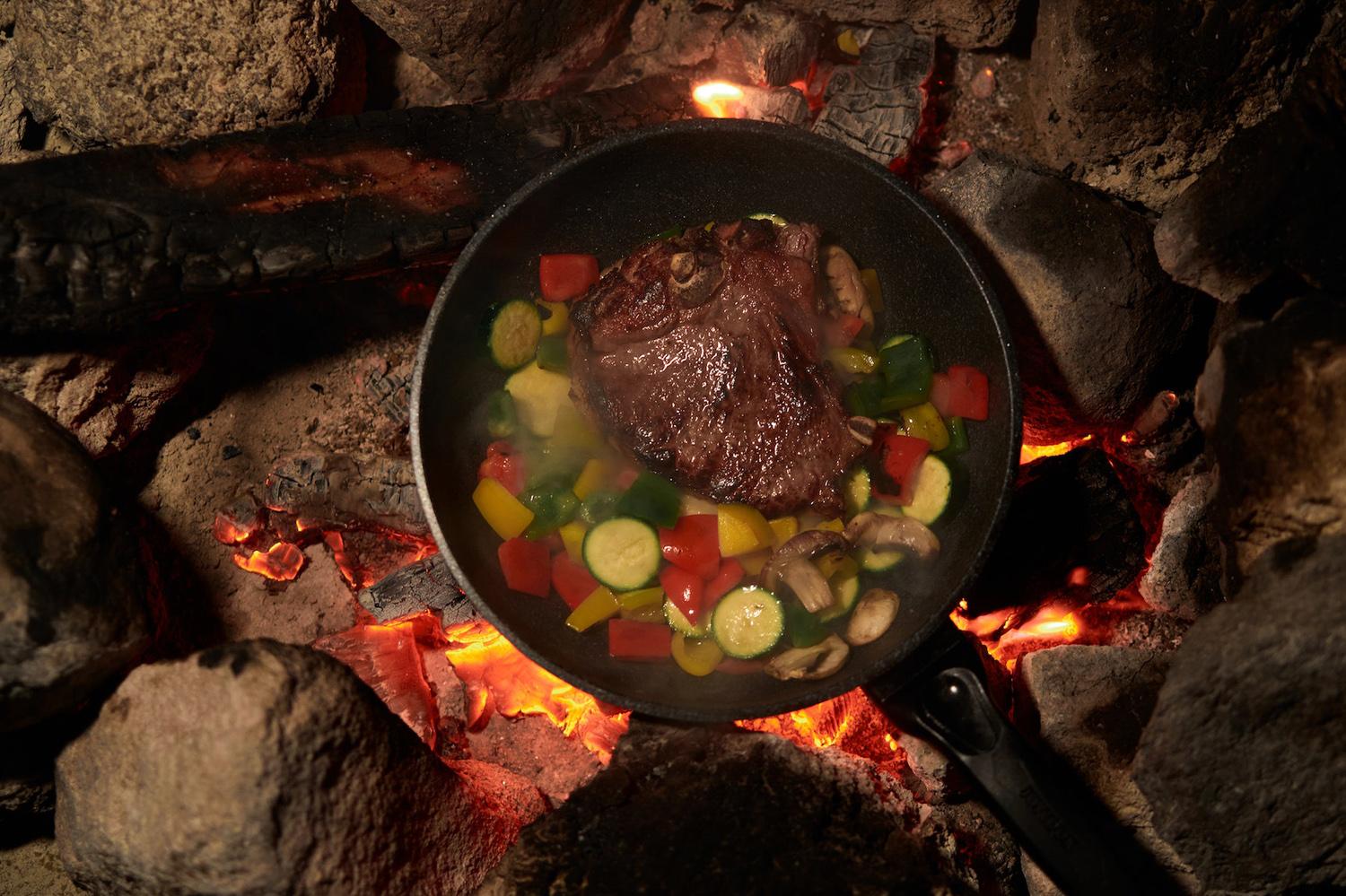
Living Stress-free in your RV
RV living may appear to be all fun and relaxation—and sometimes it is. But nothing is wonderful all the time. The RV lifestyle has its own unique set of frustrations and stressful moments like anything else. In this post, we’re looking at how to deal with its less glamorous realities so you can start living stress-free in your RV.
We’ll cover primary stressors of living and traveling in an RV and provide useful tips to help you manage your stress—so you’re able to enjoy your traveling life to the fullest. Here are some highlights...
- How to Relieve Stress on the Road
- Exercises for anyone who spends a lot of time driving
- The Best Outdoor Activities for relieving stress
Many RVs have small refrigerators that only hold small amounts of perishable items.
Limited cupboard space also means less room for storing shelf stable items.
Being super-organized will make space issues less stressful.

The Stressors of Living and Traveling in an RV
Space Limitations
A big complaint from RVers is limited space—especially limited storage space. It can be a challenge to find enough space for everything you need, much less everything you may think you want. RVs are much smaller than traditional homes and can start to feel claustrophobic. What to do?
If downsizing proves to be too much of a challenge, there are specialists to help—but first, check out some of theRV forums for creative storage options. Learning to manage your living space well will move you more quickly toward living stress-free in your RV.
RV Maintenance
If you’re not mechanically handy, RV maintenance can eat up a lot of time and money. There are the regular checks for oil and fluids, tire rotations… and then all the little—and sometimes big—things that can go wrong. Being proactive will help.
It’s important to read reviews on different RVs so you choose an RV that is the right size and type for your needs and budget—and most importantly, one that is a reliable model.
Here are some maintenance tips to help keep you stress-free on the road…
- At least once a year, schedule a maintenance check with a certified RV mechanic.
- Keep up with your regular maintenance—make sure to inspect belts and hoses as well as fluids.
- Be familiar with your RV’s systems so you can catch potential issues earlier.
- Carry a basic toolkit onboard and know how to use it.
Joining an RV club can be helpful with maintenance and other advice. Not only will you meet new people, but you’ll benefit from their collective knowledge in dealing with RV issues.
Travel Fatigue
Being constantly on the move in your RV can be stressful, especially if you’re new to it. In addition to traffic, weather conditions, and finding the right campsite, long stretches of driving can be fatiguing. This can all add to more stress effects. So, be sure to take periodic breaks.
Whether it’s just a stretching break—taking time to visit an attraction… or shooting some photos of the local scenery... it will get your circulation moving and relieve some tension. Check out the exercises below— they are great choices for people who spend a lot of time behind the wheel…or ride for long periods of time.
Climate Control
It’s difficult to maintain moderate temperature in most RVs. They’re cool in the winter and hot in the summer which causes discomfort and can make it difficult to sleep. You can improve your RV sleep greatly by attending to any issues that cause discomfort or disrupt your peace of mind.
When you start to feel the stress coming on, pop in a pair of SoundOff earbuds—the calming pink noise they play will take your mind off whatever's bugging you so you can easily drift off to sleep.
Check out this handy RV Insulation Guide for tips to aid in making your RV sleep stress-free.
Weather Surprises
RVs are not as well-protected from the elements as traditional homes. Dealing with unexpected rain, snow, and wind adds an extra layer of stress to RV living.
Be prepared by checking weather updates regularly. RV.com also offers advice for dealing with severe weather systems in your RV.

RV Rule #1: Drive safely. Avoid:
- Overloading your RV
- Driving too fast, or
- Driving in harsh conditions.
The occasional breakdown may happen anyway, so be sure to stock plenty of food and water—in case it happens in a remote location.
Here are some additional tips to keep full-time RVers safe and stress-free on the road:
- Have a plan for roadside assistance like an AAA membership, or a roadside assistance add-on to your RV insurance.
- Have a sat phone, cellular hotspot, or CB radio for emergency communication.
How to Relieve Stress on the Road
Planning ahead is one of the best ways to travel stress-free in your RV. The more you plan, the less stressful your trip is likely to be. This includes:
- Planning your route
- Making reservations at campsites, and
- Packing everything you need
But as we know, there may be hiccups along the way—and if you’re not in the right headspace, your stress levels can be pretty hard to manage.
These tips will help you avoid stress meltdowns on the road…
- Be flexible. The best laid plans, as they say… be prepared to make necessary adjustments when things don’t go quite as planned.
- Build in breaks. On long-distance drives, you should take a break every 2 hours for at least 15-minutes. Frequent short stops make you less prone to fatigue. Follow the advice of theroadtripexpert.com to be risk-free as well as stress-free while driving long distances.
- Stay organized. Keeping your RV organized will help prevent anxiety. This means a place for everything—and everything in its place. Having to look for things when you need them just creates unnecessary stress.
- Get social. RVing is sometimes a lonely experience. Connecting with other RVers can help relieve stress and make your trip more fun.
- Get your sleep. Nothing beats a good night’s sleep when you’re traveling! Make sure you’re getting enough quality sleep so you’re alert enough to drive safely—and rested enough to have a good time.
SoundOff earbuds guarantee a good night’s sleep wherever you roam.With superior noise masking to block out intrusive sounds—and calming pink noise to help you fall asleep, and stay asleep, you’ll always wake up refreshed and ready for new adventures.
While we can all use a little alone time—traveling on your own too long may create feelings of loneliness and discontent.
Engaging in quality social interactions with others in the RV community can help reduce stress and improve your mood.

Foods and beverages that reduce stress…
Whole food diets give you energy to both prevent and deal with stress. Many of these nutrients also promote good sleep. Better sleep, less stress!
Consume these healthy foods to be more stress-free…
Packed with vitamins, minerals and antioxidants, these foods boost your mood and reduce stress. Include more of these healthy options in your diet to have more energy and less anxiety…
- Berries
- Citrus
- Leafy greens
- Cruciferous vegetables
Whole grains
Whole grains are a good source of fiber. Fiber can help regulate blood sugar levels and reduce stress. These are some good choices for getting more fiber in your diet:
- Brown rice
- Quinoa
- Whole-wheat bread
Healthy fats
Healthy fats improve mood and can help reduce inflammation. Here’s where you’ll find them:
- Avocados
- Fatty fish
- Nuts
- Seeds
Lean Protein
Lean protein keeps you feeling full and satisfied and helps reduce stress levels. Basically, keeps your “hangry” self from ruining your fun and everyone else’s. Choose these healthy options:
- Chicken
- Fish
- Beans
- Lentils
Water
You’re more likely to feel stressed and tired when you’re dehydrated. Most importantly for long driving stretches, your brain needs water to stay focused on the task at hand. If you have trouble meeting your water requirements, check out these unexpected food sources that can also help keep you hydrated.
Tea
Chamomile Tea is known to reduce anxiety and promote relaxation. It also reduces inflammation and helps promote sleep.
Note: It’s a good idea to consult a dietitian or your doctor if you’re looking to reduce your stress through your diet.

Rest stops are key to relieving stress on the road.
It's also important to relieve muscle tension—so, when you take a break, start with some shoulder rolls to loosen up your neck and shoulders.
Exercises for anyone who spends a lot of time driving:
Driving in general, is linked to both stress and physical pain. You can help relieve these symptoms with improved posture and lumbar support. You may also find it helpful to make at least one of your rest stop breaks an exercise break. Get out and stretch your legs before they stress you out!
These exercises are all easy and are beneficial for relieving your muscle tension after a long drive.
- Calf raises: Calf raises are a perfect way to work your calves. Here’s how to do them: Stand with your feet shoulder-width apart and raise your one heel up off the ground as high as you can. Hold this position for a few seconds, then lower your heels back down. Now do the other heel. Stretch at least 2-3 times on each leg.
- Leg stretches help improve flexibility and reduce muscle pain. To do leg stretches, stand with one leg in front of the other. Bend the front knee until you can feel a stretch in the back of your thigh. Hold in this position a few seconds. Repeat on the other leg.
Squats are a good way to work your legs and core—and here, you can find additional additional leg exercises for those long drives.
Don’t forget to take care of your upper body muscles as well! Begin by loosening up with some shoulder rolls, then try some pushups or planks.
Why Clutter-free is Stress-free
A cluttered RV can make you feel overwhelmed. You’ll have trouble finding things when you need them—and this is both aggravating—and can cause you to feel ashamed or guilty. It often also causes one to limit social interactions as well—which can then leave you feeling isolated.
In short, excess clutter causes stress and anxiety and can stress you out in many ways…
- It can affect your physical and mental health.
- Clutter has been shown to contribute to stress, anxiety, and depression.
- It can lead to health problems such as headaches, fatigue, and difficulty sleeping.
- Can attract pests and rodents.
Getting used to your downsized space can be very difficult. And it’s not always easy to get rid of all your stuff. But, unless you want to be stressed and anxious all the time, you’ll have to deal with it. Minimalism is key.
If clutter is stressing you out, we have some tips…
- Begin by getting rid of anything you do not use or need.
- Create a system that organizes your belongings and be sure to tidy-up regularly.
- Store items you rarely use in out of the way places.
- Setting realistic goals helps—start with one room at a time and gradually work your way through.
Now that everything is looking clean and cozy, get social and invite someone over for coffee…
The Best Outdoor Activities for relieving stress
Being active remains one of the best ways to alleviate stress. Whether it’s physical activity, exercising your mind… or doing something creative, it takes your mind off whatever is stressing you out.
There are many camping and outdoor activities that can help reduce stress. Here are a few…
Bird watching:
Bird watching can be a relaxing and enjoyable way to connect with nature. Observing the birds as they flit about can help take your mind off your troubles so you’re less stressed.
Fishing:
Many find fishing a relaxing and meditative activity for reducing stress. The repetitive motion of casting and reeling can be soothing, and the quietness of nature can help to clear your mind.
Hiking:
Hiking is a great way to get exercise, enjoy the fresh air, and connect with nature. It can help to clear your mind and reduce your stress levels.
Stargazing:
Stargazing can be an awe-inspiring experience. Lying back and looking up at the stars tends to make one feel small and insignificant, which turns out to be a relief from the stresses of everyday life.
Wilderness photography:
Taking photos of nature can be a great way to appreciate the beauty of the outdoors and reduce stress. The act of taking photos helps you focus on the present moment and forget about your worries.
When choosing an activity, it is important to find something that you enjoy and that will help you to relax and de-stress.
Well, that’s a wrap.
We hope this post has provided you with useful tips for living stress-free in your RV—and wish you great sleep—all night. Every night!
Until next time…





